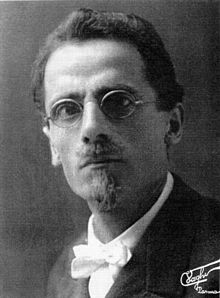Beppo Levi
Beppo Levi (born May 14, 1875 in Turin , Italy , † August 28, 1961 in Rosario , Argentina ) was an Italian mathematician .
Life
After studying at the University of Turin with Giuseppe Peano , Enrico D'Ovidio and Vito Volterra , among others , he received his doctorate in 1896 with Corrado Segre . In 1901 he became professor at TH Piacenza , in 1906 at the University of Cagliari in Sardinia, in 1910 at the University of Parma and in 1928 at the University of Bologna , where he officially retired in 1951. In 1925 he signed the Croce Manifesto against the fascists. In addition to his teaching activities, he was also active in the Italian Mathematicians' Society ( UMI ) from the 1920s and published its bulletin for many years. From 1939 to 1961 he was honorary professor at the University of Rosario in Argentina, as he was forced into exile from Italy because of his Jewish origins. In 20 years he built a mathematics institute there, already in retirement age. There he supervised, among other things, Pedro Elias Zadunaisky's doctorate on the calculation of the orbits of Jupiter's moons. From 1906 Levi made important contributions to analysis , for example to Lebesgue's integration theory (including the theorem of monotonous convergence ). 1906-1908 he wrote important works on the group structure of the rational points on elliptic curves (he reported on the International Congress of Mathematicians 1908). In particular, he tries to limit the possible torsion groups , which Barry Mazur finally succeeded in the 1970s. In addition, with Peano and before Zermelo, he was one of the first to explicitly formulate the axiom of choice in set theory (1902). As a result of the work of his teacher Segre, which he partially corrected, he made important contributions to the theory of the resolution of singularities of algebraic surfaces (1897, but later criticized by Zariski ).
His younger brother Eugenio Elia Levi is also a well-known mathematician who worked on the function theory of several complex variables. He fell in World War I in 1917, as did another of Levi's brothers.
In 1956 he received the Feltrinelli Prize . Levi had been married since 1909 and had three children.
See also
literature
- Norbert Schappacher , René Schoof : Beppo Levi and the arithmetic of elliptic curves (PDF; 270 kB) , Mathematical Intelligencer 1996 (the article also deals with Levi's other contributions to mathematics)
Web links
- John J. O'Connor, Edmund F. Robertson : Beppo Levi. In: MacTutor History of Mathematics archive .
- Biography (italian)
| personal data | |
|---|---|
| SURNAME | Levi, Beppo |
| BRIEF DESCRIPTION | Italian mathematician |
| DATE OF BIRTH | May 14, 1875 |
| PLACE OF BIRTH | Turin |
| DATE OF DEATH | August 28, 1961 |
| Place of death | Rosario (Santa Fe) |
